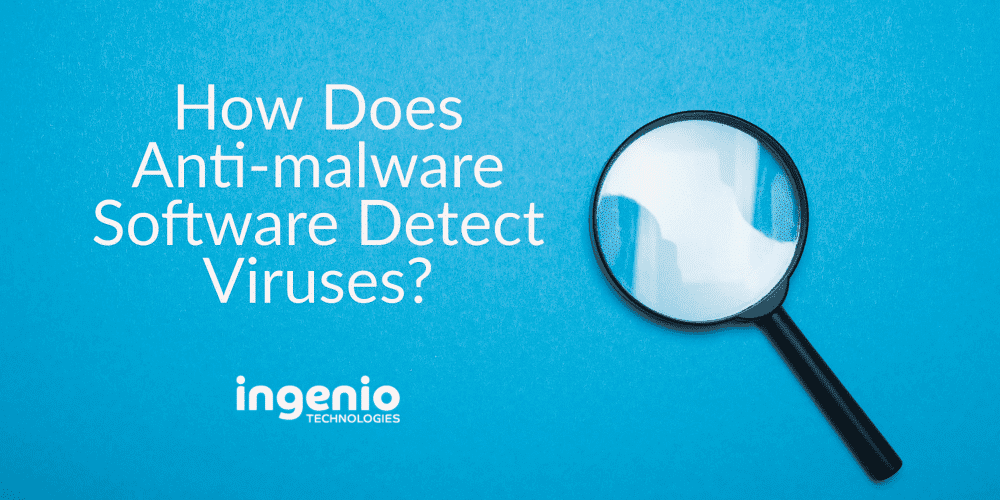Having the right cyber security is vital to keep your business safe and protected from cybercriminals. One type of cyber security that is essential is anti-malware.
In this blog, we will inform you all there is to know about anti-malware, including how it detects viruses. Carry on reading for more information.
Let’s dive in and take a look at what it actually is:
What is Anti-malware Software?
Anti-malware software is a type of computer program that helps protect your computer from malicious software, also known as malware. Malware is software that can harm your computer or steal your personal information without your knowledge or consent.
Examples of Malware
Many types of malware can harm your computer and steal your personal information. Here are some common examples:
Viruses
A virus is a type of malware that can spread from one computer to another and can cause damage to your system.
Trojans
A Trojan is a type of malware disguised as a legitimate software program or file, but once installed on your computer, it can steal your personal information or cause damage to your system.
Ransomware
Ransomware is a type of malware that can encrypt your files and demand payment in exchange for the decryption key.
Spyware
Spyware secretly collects and transmits your personal information to a third party.
Adware
Adware displays unwanted advertisements and pop-ups on your computer.
Rootkits
A rootkit can hide its presence on your computer and give an attacker unauthorized access to your system.
These are just a few examples of the many types of malware that can harm your computer. Therefore, using anti-malware software is important to help protect yourself from these threats.
How will malware affect your business?
Malware is a serious threat to your business and will have a harmful impact if you are unfortunate enough to be impacted. Malware can affect your business in many different ways, including the following:
Data Theft
Malware can be used to steal sensitive data such as customer information, financial records, and intellectual property. This can result in a breach of customer trust, reputation harm, and legal or regulatory consequences.
Disruption of Operations
Malware can also disrupt business operations by causing system downtime, network outages, or data loss. This can lead to lost productivity, revenue, and customer dissatisfaction.
Financial Loss
Malware attacks can also result in financial loss, either directly through the cost of remediation and recovery efforts or indirectly through lost revenue, missed opportunities, or legal and regulatory penalties.
Ransomware
Ransomware attacks can also affect businesses by encrypting critical data and demanding payment for its release. This can result in significant disruption and data loss, even if the ransom is paid.
Reputation Damage
A malware attack can damage the reputation of a business, especially if sensitive data or customer information is compromised. This can lead to a loss of customer trust and a business’s long-term success.
With all of these in mind, ensuring you have the right anti-malware software to protect your business from cybercriminals is important.
Anti-malware Software
There is a range of anti-malware software that you can get to protect your business, some are very popular, and you may already have heard of them.
Norton
Norton is a comprehensive antivirus and anti-malware software that offers protection against a range of threats, including viruses, spyware, malware, and ransomware.
McAfee
McAfee is another well-known antivirus and anti-malware software that offers protection against viruses, spyware, malware, and other types of threats.
Malwarebytes
Malwarebytes is an anti-malware software that focuses specifically on detecting and removing malware. It can be used in conjunction with other antivirus software for additional protection.
Kaspersky
Kaspersky is an antivirus and anti-malware software that offers protection against a wide range of threats, including viruses, spyware, malware, and ransomware.
Avast
Avast is a popular antivirus and anti-malware software that offers real-time protection against viruses, spyware, and other types of threats.
Windows Defender is a built-in antivirus and anti-malware software that comes with Windows 10. It provides basic protection against viruses, spyware, and other types of threats.
This amount of technical information can be overwhelming and difficult to understand deciding which is best to protect your business. If you need some expert advice, contact our technical team on 01273 806211 or email [email protected].
Now, let’s take a look at how antivirus software makes it possible to detect if your device has a virus.
How Does Anti-malware Software Detect Viruses?
Anti-malware software uses a combination of techniques to detect viruses and other types of malware.
One common technique is to compare files on your computer to a database of known malware signatures. These signatures are essentially patterns of code that are unique to specific malware. If a file on your computer matches one of these signatures, the anti-malware software will flag it as a virus or other type of malware.
Another technique is behavioural analysis, where the software monitors the behaviour of software running on your computer to identify suspicious activity. For example, if a program tries to access sensitive areas of your computer or modify system files, the anti-malware software may flag it as potentially malicious.
In addition, anti-malware software can also use heuristics, a method of looking for suspicious behaviour and characteristics that are not necessarily known to be associated with any specific virus or malware. For example, if a program is attempting to replicate itself across your computer or trying to contact a known malicious website, the anti-malware software may flag it as potentially malicious.
By using a combination of these techniques, anti-malware software can help detect and remove viruses and other types of malware from your computer.
We hope that you enjoyed this blog and discovered some useful information to help protect your business. If you would like to discuss this further then contact our cyber security experts today on 01273 806211 or email [email protected].


